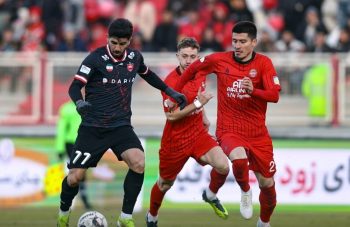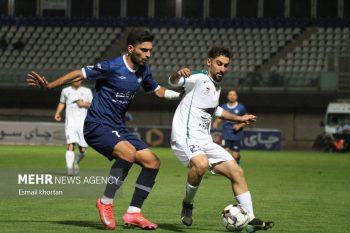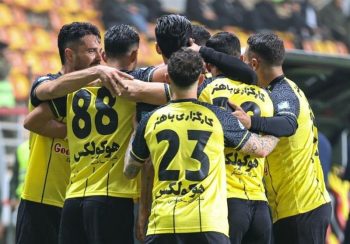Iran at heart – Interview with Ashkan Dejagah

AFC Magazine – Iran FIFA World Cup star Ashkan Dejagah has joined the growing list of Asian players signing for clubs in the Qatar stars league, but while the former Fulham and Wolfsburg man settles into a new life at Al Arabi, he is setting his sights on delivering the AFC Asian Cup for Iran in January.
Ashkan Dejagah was only an infant when his parents packed up the entire family and moved to Germany, but for anyone who questions his loyalty to Iran and the country’s cause on the football fields of the world, the man with the neck of a tattoo-adorned bull leaves no room for doubt.
“It was a big thing for me, to decide to play for Iran,” says the former Germany youth team player.
 “I spoke to my family, and for them it was always about what I wanted in my heart. This is what you have to do.
“I spoke to my family, and for them it was always about what I wanted in my heart. This is what you have to do.
“In my heart I was born in Iran, I have a lot of family there and my parents are Iranian, my wife is also Iranian so why not Iran? I love Iran and I’m proud to be Iranian.”
There is no sense of regret when Dejagah speaks of his decision to represent Team Melli, despite having been raised in the German system, growing and playing alongside many of those who went on to be crowned world champions in Rio de Janeiro’s Maracana Stadium in July.
Instead, he joins a long line of Iranian players with strong links to Germany and the Bundesliga; it is a lineage which stretches back to the mid-to-late 1990s when Iran were re-establishing themselves as a force within Asian football.
The sight of legends such as Ali Daei, Karim Bagheri and Khodadad Azizi featuring for Bundesliga clubs was a major influence on the young, impressionable Dejagah, then growing up in Berlin and hoping to forge his own career in the professional ranks.
“I saw the last Asian Cup on the TV and the World Cup in France and in Germany,” he says.
“I was always watching Iran because I have Iranian friends in Germany so we always tried to watch the Iranian games.
“There were a lot of good players who played in Germany, like Ali Daei, Khodadad Azizi, Karim Bagheri. All these players played in Germany when I was a kid, but my favourite player was Ali Karimi, because he was – and he still is – an amazing player for me. It was really nice because I played my first two or three games for the national team together with him and he helped me a lot in the games. For me, Ali Karimi is still a big player.
“I knew Mehdi Mahdavikia. I played a couple of times against him and also Vahid Hashemian and I think in 1998 in France they had a great team and big  players, and after the World Cup in France, the German teams took them. There were so many at that time. People also forget Daei, Karimi and Hashemian played for Bayern Munich, one of the biggest clubs in the world.”
players, and after the World Cup in France, the German teams took them. There were so many at that time. People also forget Daei, Karimi and Hashemian played for Bayern Munich, one of the biggest clubs in the world.”
It was, with this in mind, that Dejagah took the decision to represent the land of his birth, despite having played for Germany at every stage from U-17 to U-21 level.
His debut came against Qatar in qualifying for the 2014 FIFA World Cup in February 2012, and before long, he was exposed to the incomparable atmosphere of Tehran’s Azadi Stadium.
“Even for me, I have played a lot in big stadiums, but my first time in Iran it was crazy,” he says.
“I was shocked when I came out and I saw the people. It was amazing. I really enjoy every time I play in Tehran.
“I’ll never forget the game against South Korea when we played at home in the qualification, we had a red card. There were 100,000 in the stadium and we scored for 1-0 and I thought the stadium is going to break! It was crazy.
“I always enjoying playing in Tehran and hopefully we can give the people something back for the support they always give us.”
That support helped ensure Iran qualified for the FIFA World Cup finals in Brazil, sending Team Melli to the tournament for the fourth time in their history and setting up meetings with Nigeria, Argentina and Bosnia-Herzegovina.
 Expectations were low, but after a battling draw with the Nigerians in their opening game, Iran went close to pulling off the shock of the group stages before losing to a fine injury time strike by Lionel Messi against Argentina.
Expectations were low, but after a battling draw with the Nigerians in their opening game, Iran went close to pulling off the shock of the group stages before losing to a fine injury time strike by Lionel Messi against Argentina.
With hopes of a place in the knockout rounds still alive, though, Iran succumbed to a 3-1 loss against the Bosnians, but Queiroz and his team left Brazil with their dignity intact and their reputation enhanced.
“I think it was a great time for me, because it was the first World Cup of my career,” says Dejagah of his summer in South America.
“I think we did quite well in Brazil with Iran, also the game against Argentina was a big game for the country and we did well. We took just one point but I think all of the players did well there and we were a little bit of a surprise for the other teams.
“After the Argentina game I was shocked. We played so well against Argentina and it was hard after the game to accept this 1-0 for Argentina, but I think we showed to the whole world that we can play against big teams.”
Much of the credit for the performance went to Queiroz and the work done on the training field to prepare the Iranians for the task in Brazil and Dejagah feels the Portuguese coach will be a key component in his country’s push for a first AFC Asian Cup title since 1976.
“He’s a fantastic coach and I’m really proud to play for him and to work with him,” he says.
“Against Bosnia, after the game, he spoke to the players and, honestly, it was something in my career that I have never seen before. A lot of players were close to crying or were crying because he worked so hard with us and with all his heart.
“All of the players were happy to work with him and he gave every player a lot of confidence and we earned a lot of good things with him. I think that’s why we did well at the World Cup, the players are happy with him and I’m really happy because he is staying with us. It’s a big step for Iran for the future.
“I think we have a big chance at the Asian Cup because now I think we have shown the whole world what we can do on the pitch and all of the teams now have a lot of expectations for us and we have to show games like we did against Argentina in the Asian Cup, especially for the Iranian people. I think they are always behind us. I have never seen fans like that. They are really enjoying with their heart the game and I hope for them that we can do something big in this Asian Cup.”
While Iran went to the FIFA World Cup with few expectations, at the AFC Asian Cup in Australia the Persians will be expected to take control of games in the group stages against the United Arab Emirates, Bahrain and Qatar before pushing on to mount a serious challenge for the title once more.
Iran have not progressed beyond the quarterfinals at the AFC Asian Cup since 1996, when one of the finest teams of their generation were eliminated in the semi-finals by Saudi Arabia.
The onus is on Dejagah and company, therefore, to make an impact in Australia, but despite that, the 28-year-old does not expect Queiroz to dramatically alter the tactics that have served Iran so well since the coach’s arrival.
alter the tactics that have served Iran so well since the coach’s arrival.
“The Asian Cup will be a little bit different, but I don’t think Carlos wants to change a lot in our tactics, because we always play like that, not just at the World Cup,” he says.
“We also played that way in our qualification matches, that’s his style.
“Now, in world football, you have to work on defence a lot because that’s where the game starts. We will try to attack more and play forwards, but I think Carlos Queiroz is not going to change the whole system and say to us we need to attack and forget about defence.
“The people are saying that, now it’s the Asian Cup and Iran is a favourite and that we have to go forward. But no, I don’t think so. We can go forward, but at the World Cup we showed a lot of good defence, this is our tactic, and I think we will do the same in Australia but with a little bit more counterattacking.”
Despite Iran’s convincing performances in qualifying for both the FIFA World Cup and the AFC Asian Cup, Dejagah does not believe the Iranians will have an easy ride at the tournament.
But there is one thing he is hoping for: a reunion with former Wolfsburg team mate Makoto Hasebe, the Japan captain, in the latter stages of the tournament.
“Now there are a lot of teams that are playing well, and there are no easy games in the world now,” he says.
“Every game is hard. Teams learn how to defend, so it’s always difficult to beat also the smaller teams.
“In our group we have the Emirates, who have a good team, and also Qatar is also hard to play against. We have to focus on our game and work from game to game, and for sure there are also big teams like Australia, Japan, South Korea and Uzbekistan, I think they are a good team too. It will be a good Asian Cup in January.
“Makoto and I played together at Wolfsburg for at least four years, maybe five years, so I know him very well, he’s a good player, a great player and I know he’s a big player in Japan. He has a lot of experience and hopefully I can see him because it’s been a long time since I saw him. Maybe in the final, why not?




